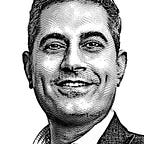Do We Need Blood Tests On Demand?
Many decades before Elizabeth Holmes was born, Indian freedom fighter Subhash Bose had the rallying cry “Give me blood and I will give you freedom”. This may well have been Theranos’ motto as it championed the cause of patients having direct access to blood testing freeing them from the tyranny of healthcare systems that prevent them from doing so. Bose was not using blood to test for markers of disease. He was fighting a war. But that doesn’t stop Holmes from seeing herself as a revolutionary.
Holmes wants people to be able to have their bloods tested for hundreds or thousands of analytes and wants this to be done on-demand and without ‘permission’ from a health professional.
The libertarian argument is obvious. If a grown up adult can buy a gun, vote for a president why the hell should they not be able to get their blood tested for whatever they want. This view is shared by legendary and outspoken investor Mark Cuban who got a lot of flak from the healthcare community when he shared his views on twitter.
The Case Against Random Testing:
140 characters is a poor format for a discussion like this one where it takes time and effort to set out the case. Fivethirtyeight.com has just done that. In their thoughtful piece they have highlighted some facts which are not something most people are aware of. The reality of blood tests is very different from what lay people have believed about them. Most tests are not diagnostic, they are indicative or have a probabilistic relationship with disease conditions. It points out the ‘incedentaloma’ problem around what do you do if you discover a stray data point?
The way I have always expressed this conundrum is by saying “For first five years of my medical education I learned what to look for, for the remaining five I learnt what to ignore”. Good doctors know what to ignore and by doing so, they can protect patients from unnecessary treatments, all of which have potential harms.
The Other Side:
- So blood tests are imperfect and are best interpreted within a narrow context by a well trained and experienced professional. Apart from this argument being elitist, it may actually be highly flawed in practice. In practice, in a recent study most ‘well trained and experienced professionals’ did not perform that well and were unable to grasp the statistical significance of tests they use (data). So the barrier erected around patients to protect them against misinterpretation is probably not protecting them. If this is true then there is a case for fewer tests not just to protect patients from themselves but also from poorly trained doctors (or perhaps, maybe, god forbid, train them better)
- Secondly, not all tests fall in the category of being poor tests. Some tests are actually pretty good at helping patients monitor themselves. Blood sugar levels are a very good example where giving patients control of their condition and test diabetes management has improved over the years. Blood sugar is a direct measure of effectiveness of diet and medication so it has that going for it but the other test for diabetes which is moving to hands of patients, HbA1C is not so cut and dry.
- Thirdly, some patients (healthy people) may want to trade their risks based on their own criteria. For example, some women, on diagnosis of BRCA1 mutations get bilateral mastectomies, others do nothing, and some others have decided to not be tested. Surely this is something health systems should support. One size doesn’t fit all. This is the 21st century FFS!
- Fourth, what if collecting more data makes these tests more usable? I am pretty sure that if we randomly test random people with random tests we will get random result but isn’t there a wide space between that and not testing people until ‘very late’? Can that space not be where we play?
